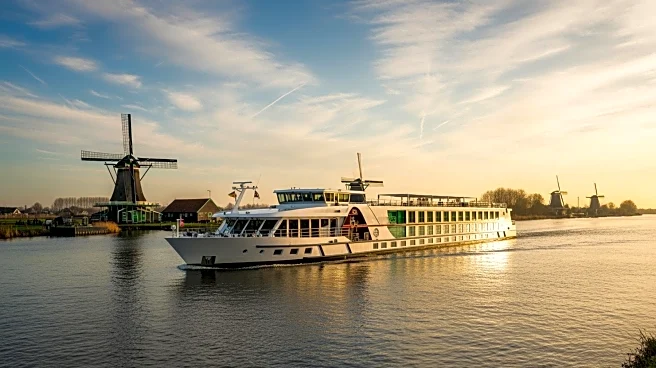What's Happening?
A luxury river cruise ship, Lumière, completed the first-ever inland dock-to-dock fully autonomous voyage on October 24. The ship sailed from Hardinxveld-Giessendam to Gorinchem in the Netherlands, navigating real-world conditions including gale-force
winds. The voyage was a demonstration of new autonomous systems, including Retina's M-Pilot maneuvering system and Shipping Technology's ST BRAIN and Autonomous Lane Assist. The systems managed the ship's route, steering, and engine operations autonomously, while the captain remained in charge. The demonstration showcased the potential for autonomous technology in river cruising.
Why It's Important?
The successful autonomous voyage represents a significant advancement in maritime technology, highlighting the potential for increased efficiency and safety in river cruising. The technology promises to reduce fuel consumption through route optimization and enhance navigation precision. The demonstration may accelerate the adoption of autonomous systems in the maritime industry, influencing future vessel designs and operational practices. The event underscores the growing trend towards automation in transportation, with implications for labor dynamics and regulatory frameworks.
What's Next?
The Lumière will continue testing autonomous systems and is set to operate on the Rhône River next year. The successful demonstration may prompt further investment in autonomous technology by maritime companies, influencing industry standards and practices. Regulatory bodies may assess and update guidelines for autonomous vessel operations, ensuring safety and compliance. Stakeholders, including technology developers and maritime operators, will likely engage in discussions to advance autonomous solutions and address potential challenges.
Beyond the Headlines
The autonomous voyage raises ethical and legal questions about the role of human oversight in automated systems. The technology's impact on employment in the maritime sector may prompt discussions on workforce adaptation and training. The event highlights the potential for sustainable practices in river cruising, with implications for environmental conservation and industry innovation. The successful demonstration may catalyze broader acceptance of autonomous technology in transportation, influencing long-term industry shifts.















